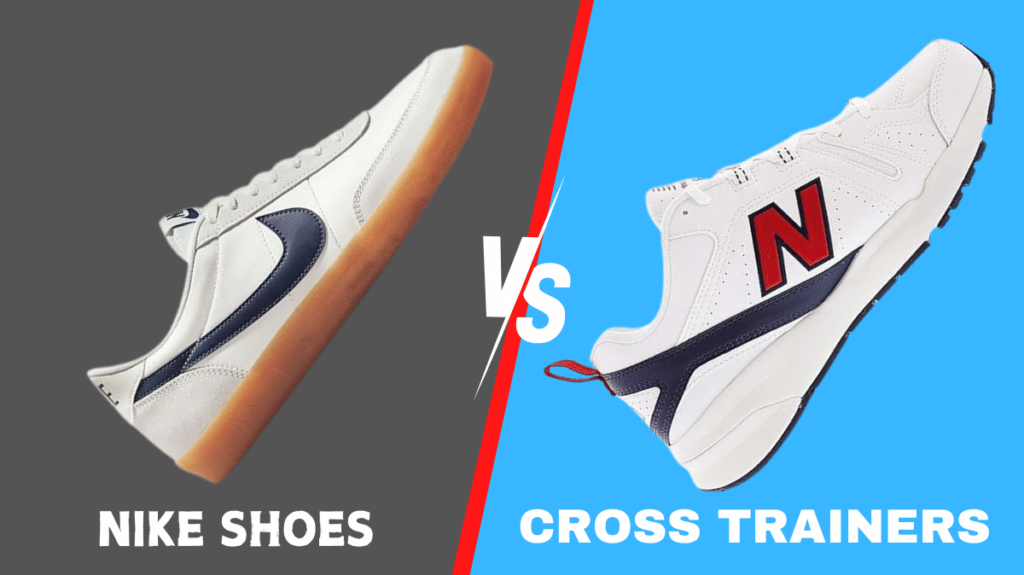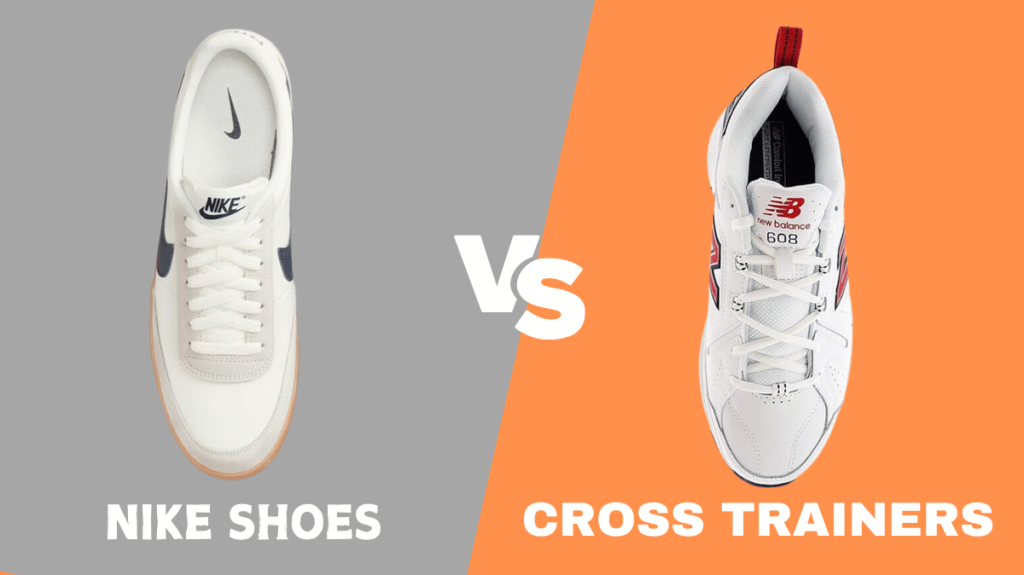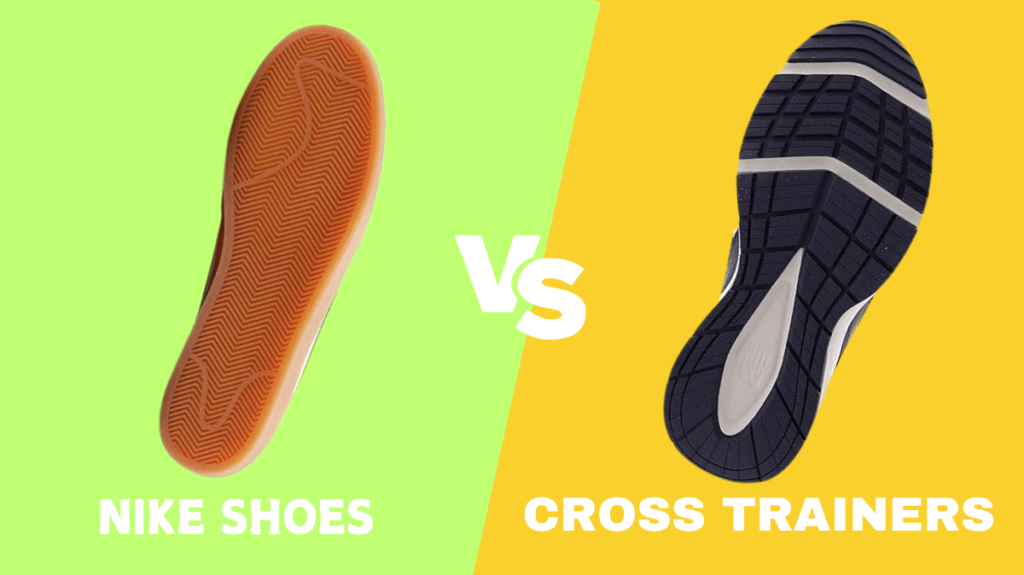Physical Address
304 North Cardinal St.
Dorchester Center, MA 02124
Physical Address
304 North Cardinal St.
Dorchester Center, MA 02124
When it comes to choosing the right footwear for your needs, understanding the differences between Nike shoes and cross trainers is crucial. Both types of shoes have their own unique benefits, and the right choice depends on your specific activities and preferences. In this guide, we’ll explore key aspects like comfort, style, design, and more to help you make an informed decision.

| Category | Nike Shoes | Cross Trainers |
| Comfort | Sport-specific cushioning (e.g., Air Max, React). | Balanced cushioning for varied movements and impact. |
| Style & Design | Trendy, fashionable designs with bold branding. | Simple, functional designs focused on versatility. |
| Durability | High durability for sport-specific wear. | Durable, but designed for indoor and gym use. |
| Breathability | Mesh materials in some models for airflow. | High breathability for intense workouts. |
| Fit | Sport-specific fit, may require size adjustments. | Typically true to size, with flexible fit for all activities. |
| Pricing | $70 – $250, depending on sport and technology. | $50 – $150, more affordable for all-in-one use. |
Nike is renowned for its innovative technology designed to enhance comfort. Many Nike shoes feature advanced cushioning systems such as Air Max and React foam. These technologies provide excellent shock absorption and support, making them a great choice for running and everyday wear.
Key Comfort Features:
Cross trainers, on the other hand, are designed to offer versatility and stability for a variety of activities. They typically have a more stable sole compared to running shoes, which helps with balance and support during high-intensity workouts.
Key Comfort Features:
Nike shoes are well-known for their trendy designs and wide range of styles. Whether you’re looking for sleek running shoes or stylish lifestyle sneakers, Nike has options to suit every taste. Their shoes often feature bold colors and innovative patterns, appealing to both athletes and fashion-conscious individuals.
Cross trainers typically have a more utilitarian design focused on functionality. They are built to handle a variety of exercises and usually have a more robust appearance. While not always as flashy as Nike shoes, cross trainers are designed to be practical and durable.

Understanding the differences between Nike shoes and cross trainers can help you select the right footwear for your needs.
Nike shoes generally follow standard sizing guidelines, but they can sometimes run a bit smaller or larger depending on the model. It’s always a good idea to try them on or consult Nike’s size guide before purchasing.
Cross trainers usually have consistent sizing but can vary between brands. Many people find them true to size, but trying them on or checking the brand’s size chart is recommended.
Nike is a globally recognized brand known for its high-quality sportswear and innovative technologies. They have a strong reputation for performance and style, making them a popular choice among athletes and casual users alike.
Cross trainers are offered by various brands, each with its own reputation. Brands like Reebok, Asics, and New Balance are known for their high-quality cross trainers, each bringing their unique strengths to the table.
Nike shoes often feature breathable mesh uppers that enhance ventilation and keep your feet cool and dry. This is particularly beneficial for high-intensity activities and long-duration wear.
Cross trainers generally have good breathability, but it can vary based on the specific model and brand. Many cross trainers include mesh panels or moisture-wicking materials to improve airflow.

Nike shoes are built to last, especially their higher-end models designed for specific sports. However, the durability can vary depending on the shoe’s purpose and materials used.
Cross trainers are designed to be durable and withstand various workouts. They often use tough materials and reinforced areas to enhance longevity.
Nike shoes are known for their excellent fit and support, with many models offering customizable options for a personalized experience. Their advanced cushioning systems provide substantial support for various activities.
Cross trainers offer solid support for a range of activities. They typically have features like extra arch support and ankle stability to help during dynamic movements.
Nike shoes tend to be on the higher end of the pricing spectrum. The cost can vary significantly depending on the model, technology, and design features.
Cross trainers are generally more affordable and provide good value for money. The price range varies based on brand and specific features, but they often offer a more budget-friendly option compared to Nike shoes.
Customer reviews for Nike shoes are usually positive, highlighting their comfort, performance, and style. However, some users may mention issues with sizing or durability, depending on the model.
Reviews for cross trainers often praise their versatility, support, and durability. Customers appreciate their ability to handle a variety of workouts and their generally affordable price.

Choosing between Nike shoes and cross trainers depends on your specific needs and preferences. Nike shoes excel in comfort, style, and innovative features, making them ideal for specialized sports and everyday wear. Cross trainers, however, offer versatility, stability, and durability, making them a great choice for a variety of workouts.
When selecting footwear, consider what you’ll be using them for, your budget, and personal style preferences. Both Nike shoes and cross trainers have their strengths, so choose the one that best fits your lifestyle and activities.
Nike shoes are excellent for running, basketball, and casual wear. Their advanced cushioning and stylish designs make them suitable for both performance and everyday use.
Cross trainers are versatile and can handle running, but they are not as specialized as running shoes. They offer more stability and support for various exercises.
Consider your primary activity. If you need specialized footwear for running or a specific sport, Nike shoes might be the better choice. For a more versatile option that handles different workouts, cross trainers are ideal.
When selecting cross trainers, focus on stability, support, and durability. Look for features like a stable sole, enhanced arch support, and robust construction.
Nike shoes are generally considered worth the investment due to their advanced technology, comfort, and style. However, ensure they meet your specific needs before purchasing.